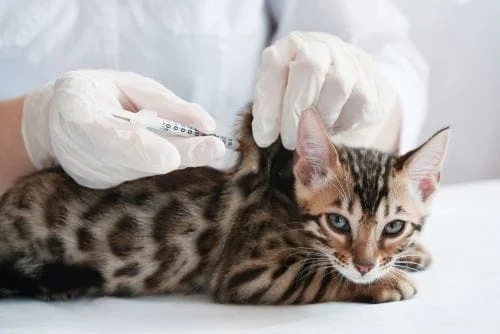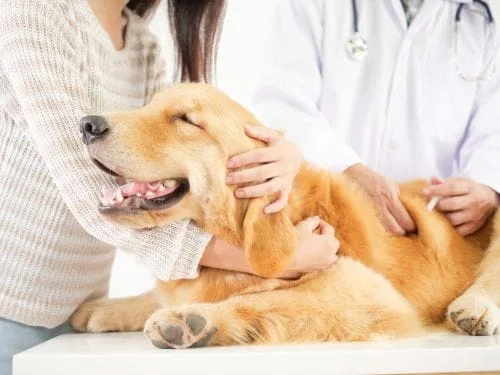The Benefits of Vaccinating
Our goal here at Windsor Park Veterinary Clinic is to ensure you get to enjoy a long, comfortable life with your companion animals. A consistent vaccination protocol is vital to that. Vaccinations lessen the severity of and even prevent certain diseases and illnesses from interfering with the health of your pet, and even your own! Our consistency in administering vaccines as a country has saved the lives of countless animals, so lets work together in continuing to protect your beloved pets and the others around them through preventative medicine.
Feline Vaccination Protocols
Even if your cat is indoor only, they could be exposed to airborne pathogens through windows, doors, or contact with you. You could acquire some unwanted house guests through an opening in your home, and your cat could even hightail it through the front door to mingle with the neighborhood cats. There are a million ways your cat could be exposed, but there's only one way to protect them from that potential exposure: by vaccinating! Lets go over why each is necessary.

- Rabies. This is a mandatory, legally required vaccination. Animals infected with rabies can appear friendly at first before assuming strange or aggressive behaviors, putting an unvaccinated animal at risk for contraction, and by proxy, you. There is no cure for rabies. With that being said, rabies is entirely preventable through vaccines, and we carry a special brand of rabies vaccinations for cats at Windsor Park Vet Clinic. It was made with only cats in mind, reduces the risk of reactions, and is boostered annually.
- FVRCP (Feline Viral Rhinotracheitis, Calicivirus, and Panleukopenia).
- Symptoms of rhinotracheitis and calicivirus include upper respiratory symptoms like rhinitis, sneezing, oral ulcers and discharge from the eyes and nose.
- Calicivirus in particular can pack a nasty punch, with oral ulcers leading to conditions like stomatitis, and more severe strains can seed to the rest of the body, fatally infecting internal organs.
- Panleukopenia, often referred to as feline distemper, can often prove fatal and is highly contagious. It can cause severe sickness including fever, anorexia, vomiting and diarrhea. The virus can even infect the bone marrow, targeting white blood cells and deeply weakening the cat's immune system.
- This is considered a core vaccination, and is considered essential especially in a cat's younger years, which is why we do a series of 3-4 vaccines starting at 8 weeks of age.
- Leukemia. Though often considered a lifestyle vaccine, we consider it imperative to administer, especially if your cat goes outside or is at risk of escaping your home. Some cats can return home with leukemia even from the smallest excursion, and can go on to infect other cats in your neighborhood or any additional cats you have at home. It is contracted through a wide array of bodily fluids, and most commonly infection takes place after grooming, fighting, or sharing food bowls with other cats. Some cats can live comfortably with leukemia for years, but some are not so lucky. We prefer to not leave it up to chance and recommend vaccinating your cat for leukemia in their younger years especially. If they contract this disease, things like lymphoma and immunosuppression can take hold, leading to secondary diseases.
Canine Vaccination Protocols
From an active, outdoorsy lifestyle, to a pampered apartment life, every dog needs a consistent vaccine protocol to stay healthy. Dogs have a bit more vaccinations on the list to maintain than cats, but they're all important in different ways. Lets go over what puts your dog at risk for these diseases, and how we can lessen the severity of disease and infection or prevent them entirely with vaccines.
- Rabies. This is a mandatory, legally required vaccination. As described in the above section, animals infected with rabies can appear friendly or docile at first, and may even approach you or your dog before becoming aggressive. There is no cure for rabies, but vaccinating your dog can save their life should they ever come into contact with an infected animal. It's important to keep this up-to-date, so please booster it as advised by your Veterinarian. If your pet comes into contact with a potentially infected animal, please call us so we can booster their vaccination. Any mammal can contract rabies, including humans!
- DAPP (Distemper, Adenovirus, Parainfluenza, and Parvovirus). This 5-in-1 vaccination is incredibly vital to the health of your dog, especially younger pups who haven't built up any sort of immunity yet on their own and are losing the immunity they obtain from their mothers by around 8 weeks of age.
- Distemper targets many of the body's systems, and can progress from vomiting, diarrhea, coughing and fever to seizures, pneumonia and even paralysis. Dogs that do survive distemper often suffer from permanent brain damage.
- Adenovirus encapsulates both a variant of kennel cough that attacks the upper respiratory system and infectious hepatitis, which can cause permanent damage to the liver, kidneys, and eyes.
- Parainfluenza is not related to Canine influenza, and is yet another variant of kennel cough. This attacks the upper respiratory system, resulting in coughing, sneezing and nasal discharge. This is often contracted when your pet comes into contact with many other dogs.
- Parvovirus can be treatable, but is often fatal. Young puppies are especially at risk, and often don't have the immune system to fight off the infection well. This virus can cause vomiting, diarrhea, extreme loss of fluid and protein, and often requires intensive care to treat. This virus can be killed with disinfectants, but is often elusive and can live in soil outside for as long as a year. This is another reason we recommend not walking your puppy on unknown soil until they're fully vaccinated at 16 weeks of age. This sickness is deadly but preventable, and we cannot stress it's importance enough.
- Leptospirosis. This bacterial infection can be passed from wildlife to both dogs and humans, so prevention through vaccination is important to the health of all of us. It's often found in wet or heavily wooded areas that see a lot of foot-traffic from wildlife. It can be found in lakes, in puddles, and muddy areas with stagnant water. It's most often contracted directly through the urine of an infected animal, and can be very sneaky to diagnose. It can start off with symptoms as simple as a fever, diarrhea, and vomiting, but if left untreated, will seed infection to the rest of the body, potentially causing permanent damage to internal organs like the liver and kidneys and even death. Lepto has spread across the country rapidly, and we are seeing a lot of concentrated cases in Texas specifically, making us a high-risk area.
- Bordetella. This vaccination is truly lifestyle based, but highly recommended for dogs that are very social with other dogs or otherwise active in areas where lots of dogs frequent, including doggy daycare, grooming, and dog parks. This bacterial infection affects the upper respiratory system, and while the vaccination may not prevent infection entirely, it can reduce the severity of an infection, lessening the risks of developing things like pneumonia.
- Influenza. Canine Influenza also attacks the upper respiratory system, causing mild to severe infection dependent on the patient's own immune system. Some dogs may show no symptoms at all, while others experience lethargy, coughing, sneezing, and nasal discharge and runniness. Canine influenza can become serious if a pet develops pneumonia, and these cases often require hospitalization and can sometimes be fatal. Some Veterinarians specializing in pathology believe the number of Canine Influenza infections are being severely underreported, and it may be more prevalent than we've known it to be.
Have Questions?
Feel free to reach out to us for any further clarification needed via phone, text, or email.



